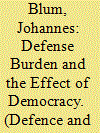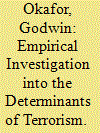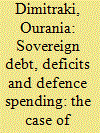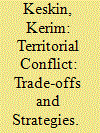| Srl | Item |
| 1 |
ID:
162247


|
|
|
|
|
| Summary/Abstract |
Can textual analysis improve statistical prediction of risky geopolitical events? North Korea is the greatest source of geopolitical risk for South Korea due to the former’s unpredictable and secretive military actions against the latter. We find that the tone of English language news articles published by non-South Korean news media, especially U.K. news media, has significant predictive power about North Korean military aggressions. The inclusion of language tone improves the predictive power of the empirical model by as much as 47%.
|
|
|
|
|
|
|
|
|
|
|
|
|
|
|
|
| 2 |
ID:
162243


|
|
|
|
|
| Summary/Abstract |
Do democracies spend less on national defense? This paper provides new evidence of the effect of democracy on defense burden based on a Spatial Durbin Model with panel data for 98 countries for the years 1992–2008. While democracy measured by means of an index variable covering the entire range from perfect democracy to perfect autocracy turns out to be insignificant, dummy variables indicating transition to higher levels of democracy reveal a statistically highly significant negative effect of democracy on a country’s defense burden. Allowing for country-specific effects reveals heterogeneity in the effect of democracy across countries. Apart from the effect of democracy, the estimation results indicate strong spatial dependence of military burdens across countries. Moreover, they provide statistical evidence for a peace dividend, for substitution effects in defense spending and for a negative effect on the military burden for countries when they exhibit a trade surplus instead of a trade deficit.
|
|
|
|
|
|
|
|
|
|
|
|
|
|
|
|
| 3 |
ID:
162242


|
|
|
|
|
| Summary/Abstract |
The impact of national defense research and development spending on overall innovation depends on the extent to which the knowledge and technologies generated by defense funding diffuse. This article uses an original data-set of patents assigned to defense-servicing organizations to investigate the diffusion of military technologies. Contrary to the predictions of the prevailing scholarship, I find no difference in the rate of diffusion between civilian and military technologies. Neither do military technologies assigned to government agencies diffuse at different rates than those assigned to firms. The overall technological experience of the patent assignee is found to be a positive predictor of the diffusion of military technologies. The effect of the prevailing intellectual property rights regime is ambivalent: when US patents are included in the sample, the effect of patent protection is positive, when the US is excluded, the effect is either non-significant or negative depending on the model specification that is utilized.
|
|
|
|
|
|
|
|
|
|
|
|
|
|
|
|
| 4 |
ID:
162248


|
|
|
|
|
| Summary/Abstract |
We use the k-th-order nonparametric causality test at monthly frequency over the period of 1985:1 to 2016:06 to analyze whether geopolitical risks can predict movements in stock returns and volatility of 24 global defense firms. The nonparametric approach controls for the existing misspecification of a linear framework of causality, and hence, the mild evidence of causality obtained under the standard Granger tests cannot be relied upon. When we apply the nonparametric test, we find that there is no evidence of predictability of stock returns of these defense companies emanating from the geopolitical risk measure. However, the geopolitical risk index does predict realized volatility in 50% of the companies. Our results indicate that while global geopolitical events over a period of time is less likely to predict returns, such global risks are more inclined in affecting future risk profile of defense firms.
|
|
|
|
|
|
|
|
|
|
|
|
|
|
|
|
| 5 |
ID:
162249


|
|
|
|
|
| Summary/Abstract |
This study investigates the determinants of terrorism in countries that are in the top category of the Fragile States Index (FSI), and are also prone to terrorism. Panel data for 38 countries mainly from Sub-Saharan Africa, the Middle East and North Africa, and South Asia for the years 2005–2014 are used. Findings from the negative binomial and fixed effects estimation show that fragile state, number of refugees and youth unemployment have positive and significant impacts on terrorism. Military spending is positive but less robust across models. Conversely, FDI and remittances have a negative impact on terrorism with the former less robust. Governance and foreign aid are negative and insignificantly related to terrorism. Policy implications follow from the findings.
|
|
|
|
|
|
|
|
|
|
|
|
|
|
|
|
| 6 |
ID:
162244


|
|
|
|
|
| Summary/Abstract |
The economics of stolen valor concerns the act of trading on false claims of being awarded valorous military service medals. The U.S. Supreme Court overturned the 2005 Stolen Valor Act, largely on First Amendment grounds. Misrepresentation that devalues the reputation of medals for valor may not violate the revised statute despite decreasing the wage premium and discouraging investment in military effort.
|
|
|
|
|
|
|
|
|
|
|
|
|
|
|
|
| 7 |
ID:
162241


|
|
|
|
|
| Summary/Abstract |
This paper explains and assesses the UK experience with determining prices and profitability for non-competitive defence contracts. Three periods are considered, namely pre-1968, the 1968 Profit Formula Agreement and the changes introduced in 2014. Two cases of ‘excessive’ profits were major determinants of the 1968 Profit Formula Agreement; but continued dissatisfaction with the 1968 Agreement led to changes in 2014. The historical overview of UK experience provides a basis for understanding current UK policy and offers insights for other countries facing similar policy challenges. A critique is presented of UK policy on single source pricing and profitability.
|
|
|
|
|
|
|
|
|
|
|
|
|
|
|
|
| 8 |
ID:
162245


|
|
|
|
|
| Summary/Abstract |
This paper studies a strategic conflict between a state and a non-state military organization. The non-state military organization decides whether to attack or not to attack the state, while the state decides on its counter-measure. If the state uses a high level of violence against the non-state organization, it may be accused by the international community of ‘non-proportional’ use of force, and both sides of the conflict take this possibility into account. The model predicts that it may be rational for the non-state organization to attack the state, even if as a reaction the state will militarily destroy this organization, due to a positive probability the state will be punished by the international community for non-proportional use of violence.
|
|
|
|
|
|
|
|
|
|
|
|
|
|
|
|
| 9 |
ID:
162250


|
|
|
|
|
| Summary/Abstract |
The outbreak of the sovereign debt crisis at the end of 2009 in Greece led to a severe recession, and constant economic problems. This paper investigates military expenditure among others as a potential factor to the growth of sovereign debt in Greece over the period 1960 until currently. Our empirical findings suggest that high deficits, inflation and military spending have been the primary causes of debt growth in Greece. The structural break models reveal a much higher effect of deficits and inflation in the post-1990 period while the threshold switching regression, based on the level of sovereign debt, indicate that for levels of debt-to-GDP ratio above 90% deficits, inflation and military expenditures had significantly more pronounced effects on government debt changes.
|
|
|
|
|
|
|
|
|
|
|
|
|
|
|
|
| 10 |
ID:
162246


|
|
|
|
|
| Summary/Abstract |
We study a war scenario in which the winner occupies the loser’s territory. Attacking a territory increases the chance of winning, but also causes harm, which in turn decreases the territory’s value (i.e. the reward of winning). This paper highlights the effects of this trade-off on the equilibrium strategies of the warring states in a contest game with endogenous rewards. Providing both static and dynamic models, our analysis captures insights regarding strategic behavior in asymmetric contests with such conflict.
|
|
|
|
|
|
|
|
|
|
|
|
|
|
|
|